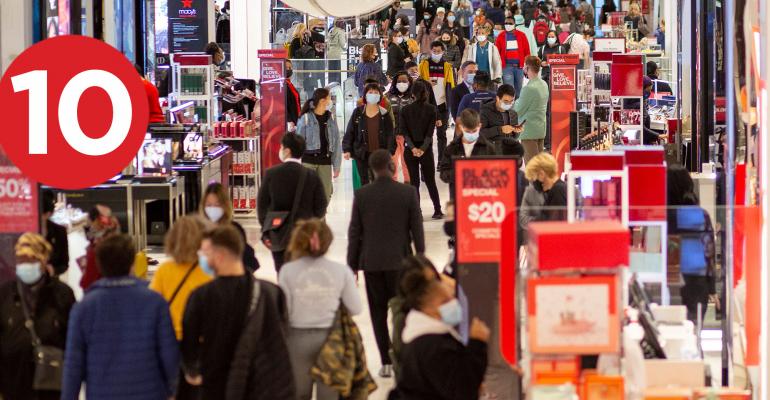- Black Friday shopping in stores craters 52% during pandemic as e-commerce sales surge “Traffic at stores on Black Friday fell by 52.1% compared with last year, as Americans by and large eschewed heading to malls and queuing up in lines for shopping online, according to preliminary data from Sensormatic Solutions. For the six key weeks of the holiday season this year, traffic in retail stores is expected to be down 22% to 25% year over year, an earlier forecast by Sensormatic Solutions said.” (CNBC)
- How Will Co-Living Survive the Pandemic? “After the initial shock, most co-living companies coalesced around a few strategies to woo residents back. They offered rent concessions, promoted flexible lease lengths to tenants who didn’t know how long they would be able to stay in New York, and provided a smooth and easy move-in process. Now, eight months into the pandemic, co-living companies say demand is growing again, and a few are even restarting ambitious expansions they had put on hold when the virus first hit.” (The New York Times)
- The death of the department store and the American middle class “For the American middle class of the 20th century, department stores helped shape what successfully living the American dream looked like. These stores were often an entry point into fashion and home furnishing trends once reserved for only the wealthiest, since they offered large selections of name brands at affordable prices all under one roof — first in big cities, and then following population exoduses out to the suburbs. And as the main attractions for malls in the suburban US, they played a foundational role in the idea of shopping as a social activity in the second half of the 20th century.” (recode)
- Fauci said authorities should 'close the bars and keep the schools open' to cut down on coronavirus infection spread “Dr. Anthony Fauci on Sunday said that bars should be closed as a way to help localities reduce the spread of COVID-19 infections, allowing children to safely return to their classrooms. In an interview on ABC's ‘This Week,’ Fauci, the director of the National Institute of Allergy and Infectious Diseases, gave a blunt assessment of how jurisdictions should approach the coronavirus pandemic during this critical stage.” (Business Insider)
- CMBS 2020 Volume Clocks In At an Eight-Year Low of $53B “Kroll Bond Rating Agency expects CMBS volume to end 2020 between $53 billion and $55 billion, which is well below the $95 billion it forecasted last fall. The good news is that KBRA expects CMBS issuance to rebound slightly to $60 billion in 2021, driven by stable demand for multifamily, industrial (more specifically last-mile distribution centers), individual pockets of office with tenants that have good credit and essential retail.” (GlobeSt.com)
- Transwestern CEO Larry Heard talks COVID, the Amazon effect and suburban life “Landlords in the hardest hit sectors will face significant challenges in the coming months and investors willing to bet on the industry’s recovery will have opportunities, said Larry Heard, CEO of Houston-based commercial real estate firm Transwestern, a family of companies that provide operating, investment management and development services.” (Houston Chronicle)
- Is A Republican Or Democratic Administration Better For CRE? Turns Out, It's A Tie “A recent study by Newmark analyzed returns on investment in CRE under the presidential administrations of the last 40 years and found little difference, but surprisingly, what edge there is goes to Democratic presidents. Since the beginning of the Reagan administration in 1981, the report notes, annualized total CRE returns for all asset classes have averaged 9% during the years when a Democratic president was in office (16 years) and 8.2% when a Republican was in office (24 years).” (Bisnow)
- CEO sees a chance to "make billionaires" in LA multifamily market “In the short term, LA brokers and originators working in multifamily spaces have had to move with agility to stay afloat for those investors who see an opportunity in a low rate environment and weaker multifamily market. In the long term, one CEO sees serious opportunity in the LA multifamily space when the pandemic subsides, and the pull of the silver city can be felt across the country again.” (MPA Mag)
- How Family Offices' Real Estate Investments Can Withstand This Pandemic “By and large, family office investors are in a better position to invest today than they were during the Great Recession and are willing to learn from the lost opportunities from the recession. Before, family offices were unsure of the market, and the majority of families waited until they saw an uptick happening to give them the confidence to invest.” (Forbes Real Estate Council)
- Underground Atlanta sold to local real estate investment company “WRS, the South Carolina development company that purchased Underground Atlanta in 2017 with plans to transform it into a mixed-use development, has sold the property to a local real estate investment company. A press released announced that Shaneel Lalani, CEO of Billionaires Funding Group (BFG) and Lucky Fortune, is acquiring Underground Atlanta ‘with plans to maximize the potential of the historic entertainment destination and connect the storied district with the investment and growth happening in Downtown Atlanta.’” (Atlanta InTown)
0 comments
Hide comments

